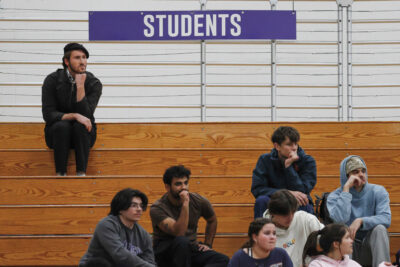These days, operas and operettas are buzzing on everyone’s lips. With the first weekend of “The Gondoliers” a success, “operas” are the new Big Theater Thing of Spring 2009 – just like “the truth being unknowable” was the Big Theater Thing of Spring 2008.
But perhaps some of us are embarrassed to admit how little we actually know about operas. From whence did they come? Who wrote the first opera? What’s the difference between an opera, operetta and operettetetta? When will someone finally write an opera about video game characters?All of these questions and more will be answered over the course of this article. However, one quick disclaimer: it has been a year since I took music history. The brain, scientifically speaking, can only hold information it learns in classes for a maximum of two days. (It has been four years since my last biology class.)
Therefore, those of you “in the know” may detect several slight exaggerations, oversimplifications and outright lies. Such misinformation, just like the presence of sarcasm, has NO place on a college newspaper funnies page, and I urge you to write to the editor if you are furious. Direct all your opera information to tylerjy@goshen.edu.
In the beginning, people thought that singing and acting were like aardvarks and water skiing. There was no logical reason to put them together. Then one day, Italian composer Claudio Monteverdi had a wacky dream from eating calzones right before bed.
When he woke up, he said, “Hey, there’s no reason I can’t write a play about two singing lovers in Hades!” Thus he wrote “Orfeo!,” a smash hit that picked up many Tony Awards from the royal court.
Now there are some people – mostly “historians” – who would say that Monteverdi didn’t write the first opera, just one of the earliest operas that is still performed today. But those people are just like the historians who say Columbus didn’t discover America, or George Washington didn’t really shoot lasers from his eyes. They make things harder to summarize in five hundred words.
Anyway, back to opera.
The next person you need to know about is Mozart. Mozart, as we all know, had the Mozart Effect and wrote his first symphony while in the womb; listening to that symphony made him extremely smart. It’s no surprise that Mozart’s operas are insanely good: “The Magic Flute,” “Don Giovanni” (Mr. John), “Cosi Fan Tutti” (The Magic, Cozy Flute) and “Le Nozze di Figaro” (Singing in the Rain).
We can only imagine how good Mozart’s operas would have gotten if he had not died so young, murdered by Salieri, a jealous composer. Again, historians will say this is not actually true, but if not, why would they make a movie about it? And why would that movie go on to win a bunch of Oscars? Think about it.
Then opera somehow became associated with heavy women in Viking outfits singing about love and death. This can probably be attributed to Puccini’s masterpiece, “Vikings! Songs of Love and Death.” It might, however, also be the responsibility of Richard Wagner, whose operas were nothing if not dramatic.
Wagner, it should be noted, was basically a terrible person. He yelled at puppies, spat on kittens and – although it’s an exaggeration to say he started World War II – started World War II. However, Wagner did write many important pieces, such as “Ride of the Valkyries” and the soundtrack to the “Lord of the Rings” movies, years before they were even made.
Meanwhile, Gilbert and Sullivan were relaxing in England sipping on tea, while Wagner was drinking moonshine from skulls. Because of this, Gilbert and Sullivan wrote happier, more pleasant fare, in which almost no one got murdered. Gilbert and Sullivan also wrote operettas, which are different from operas since they have a mix of singing and spoken word.
Operettas are also different from musicals (which ALSO have a mix of singing and spoken word) because no one in the music world takes musicals seriously. People also generally look down on rock operas, hip-hoperas and Doo-Woperas.
So there you have it – everything you wanted to know about opera but were afraid to ask. I even taught you without making any self-serving shameless plugs.
And now, the next time you go see an opera (“Il Fratelli Mario,” the new Mario opera opening in Umble Center on April 22!), you’ll be better informed.


